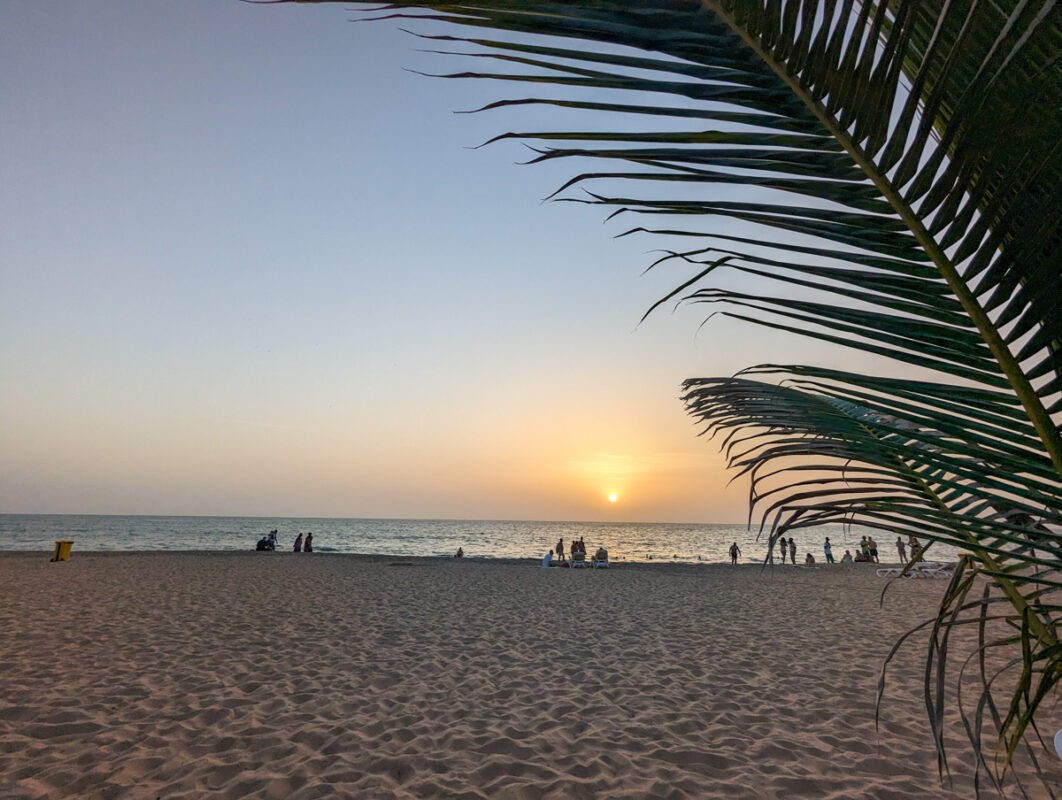Sun, sand and not many other tourists make a Senegal beach holiday a totally underrated trip. Here’s what you can expect!
Humidity enveloped us the second we stepped out of Blaise Diagne International Airport, despite it being two in the morning. We’d flown from Algiers, a seemingly short hop across northwestern Africa on the globe but a four-hour plane ride – and a traverse from an arid to tropical climate – in reality.
“Welcome to Senegal!” our driver greeted us, handing us a bottle of chilled water each. “Drink up, this country’s a sauna”.
Senegal’s beach resorts, Saly and Pointe Sarene, are around an hour’s drive from Blaise Diagne International Airport, which sits equidistant from the coast and Dakar, the capital.
On the approach to Pointe Sarene, we noticed the RIU Hotel Baobab illuminated like a lantern amongst the pitch-black sky.
We were about to spend four days here on a Senegal beach holiday. Here’s why we loved it.
We were the first tourists of the season in Senegal
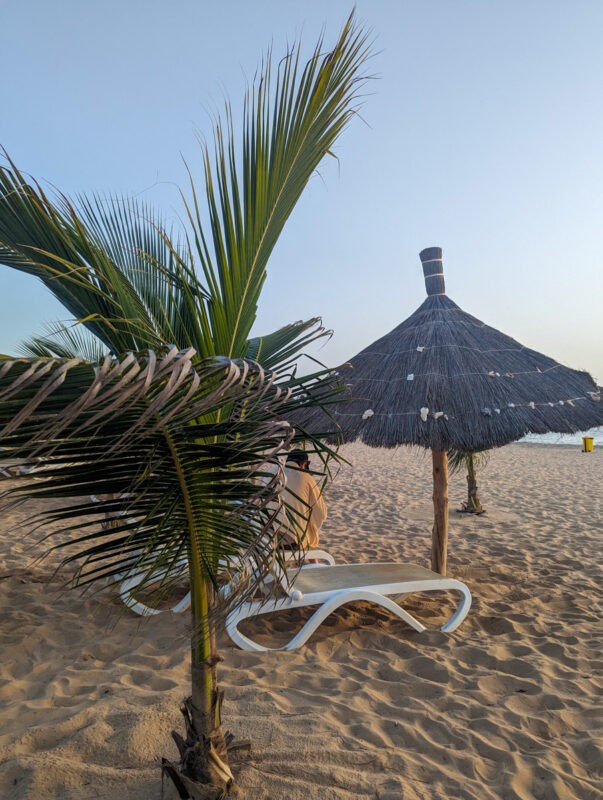
“Welcome, welcome” the receptionist greeted us. “Did you fly here from Lisbon?”.
At the beginning of October, the Senegalese beach season is only just kicking off. TAP Air Portugal and Air France offer regular year-round flights to the West African country, but charter flights from the UK are reserved for just the peak season (November to March).
The Hotel RIU Baobab is a pioneer of its kind in Senegal – a luxury five-star resort with a complex of pools, restaurants and other facilities, set against a clean, safe beach with gently lapping waves that feel like bathwater.
Opening in 2022, it offers all-inclusive holidays (bookable with TUI) with flights, catering and accommodation. Day trips are paid for separately.
The hotel’s facilities
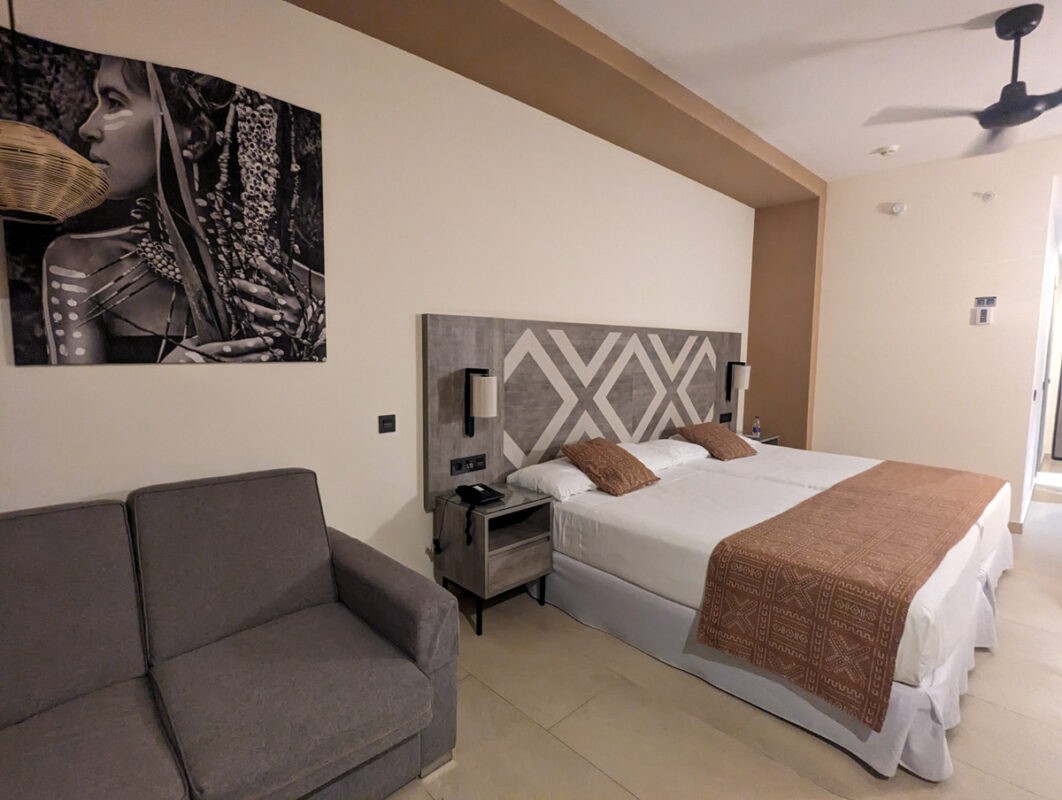
“This is your room!” our porter introduced, as he swiped the keycard and opened the door.
Decorated to perfection, our room at the Hotel Riu Baobab sprawled with a separate seating area overlooked by Senegalese artwork, a massive super king-size bed groaning under duvets and a plush mattress, an HD TV with tea and coffee facilities underneath and a generously stocked minibar.
Stepping into the modern bathroom, I noticed a rain shower and a double sink (so we can brush our teeth at the same time! I told my partner).
Being 3 am, only one thing was on our mind – bed. We sunk into the mattress and woke up six hours later.
My body woke up crying for exercise, so I headed to Hotel RIU Baobab’s gym. Although it wasn’t the largest, I got in a good, albeit sweaty, workout on the free weights and running machine, before jumping in the pool.
There’s a network of brilliantly blue swimming pools at the hotel – one of which is home to a swim-up bar – but for the more chilled among us, quieter pools invite at either end.
Being out of season, we enjoyed our pick of the loungers, soaking in the rays before plunging into the water.
The powdery golden private beach at the hotel is dotted with wooden and straw parasols, loungers lazing underneath and sounds of the waves crashing in the distance.
Food at the hotel RIU Baobab
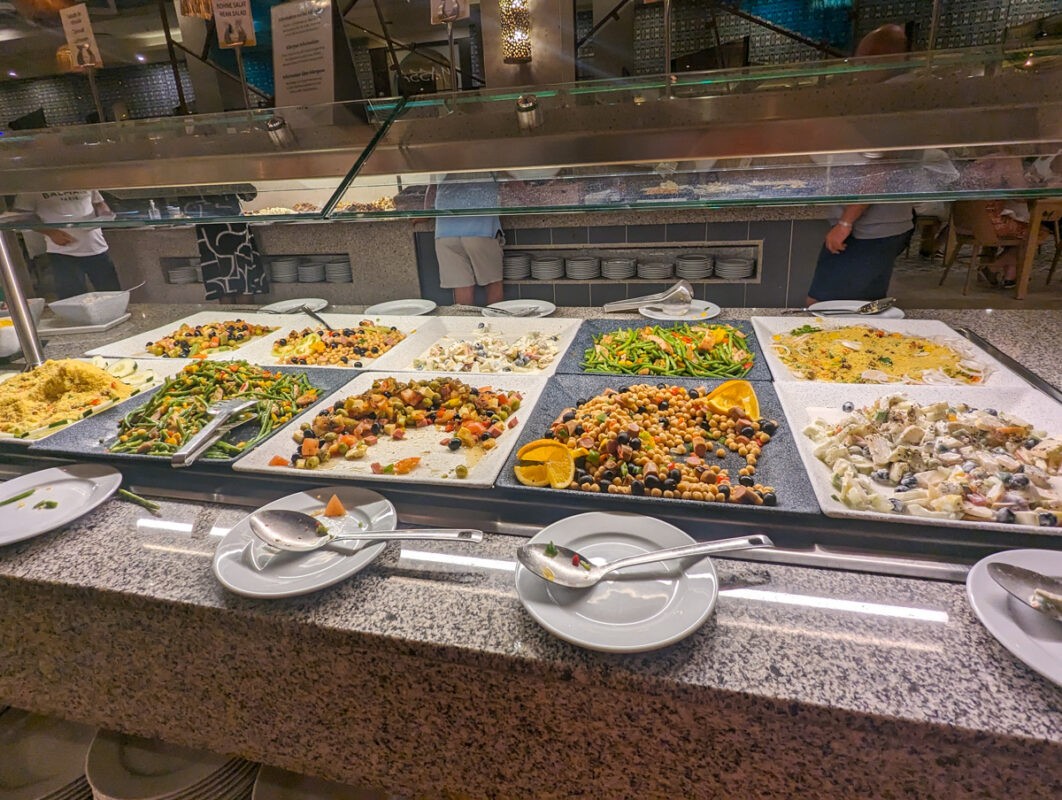
In the morning, the breakfast buffet expanded across the restaurant.
Dozens of types of bread, tropical fruit (fresh and dried), an eggs station, full fry-up ingredients, cakes as far as the eye could see and multiple types of juices (baobab was my favourite) all stacked up.
For lunch, there was a surprising range of vegetarian food, including different fried and grilled vegetables, pasta and pizza. Senegalese dishes (although unfortunately not vegetarian) were ideal for any adventurous eater.
While the hotel buffet was more than sufficient, the hotel also boasts two specialist restaurants: Dorayaki which serves Japanese dishes, and Veneto which specialises in Italian food.

Both are buffet-style, so don’t expect fine dining, but each served up tasty regional dishes that made a welcome change from bog-standard all-inclusive food (again, with plenty of veggie options).
Each night, once we’d dined on our main meal, I wandered over to the main buffet, where I smothered hot melted chocolate onto fresh fruit. Delicious!
Excursions from the hotel
Fresh green flora in the lobby, invitingly blue pools (there’s even a waterpark) and the golden beach will entice you to remain at the five-star hotel, but if you’re itching to explore Senegal excursions depart right from Pointe Sarene.
Safari
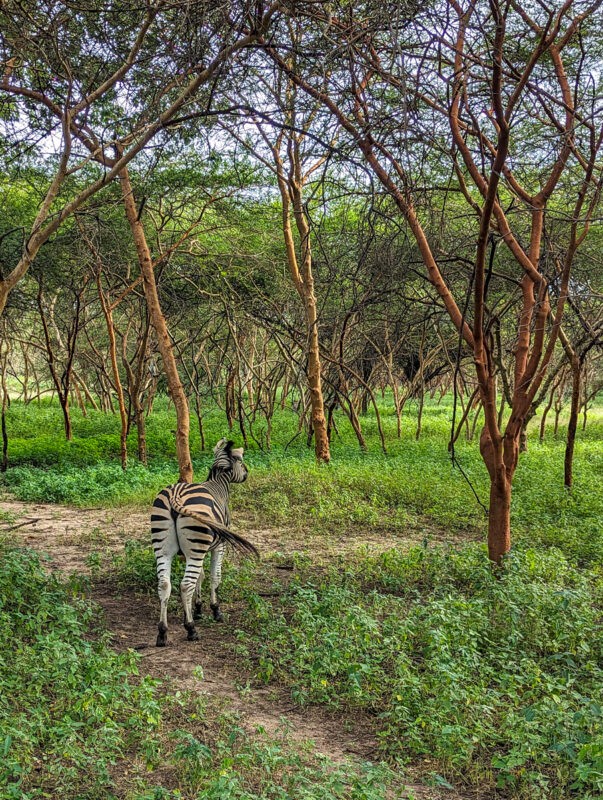
Safaris depart from the Hotel RIU Baobab every morning at 7:30 am, driving for around 45 minutes to reach Bandia Safari Park.
While not my favourite safari experience in Senegal (that award goes to Fathala in the south) in Bandia four-wheel tracks run through a bright green vegetative landscape dotted with sacred baobab trees.
Upon arrival in the park, we boarded a 4WD all-terrain vehicle with a local guide. He briefed us on the park (it opened in 1997, the species were native to Senegal and were re-introduced to the country and there are no natural predators in the park) before we set out on our drive.
In Bandia, you’re almost guaranteed to see all the big game that live there: giraffe, rhino (although there are only two!), antelope and zebra. West African crocodiles laze on the banks of the river running through, too!
Generally, conditions were natural, but the hyenas were caged in (“they have to be, as they’re the only predator” we were told), which did give the park a slightly zoo-like vibe.
Saloum Delta
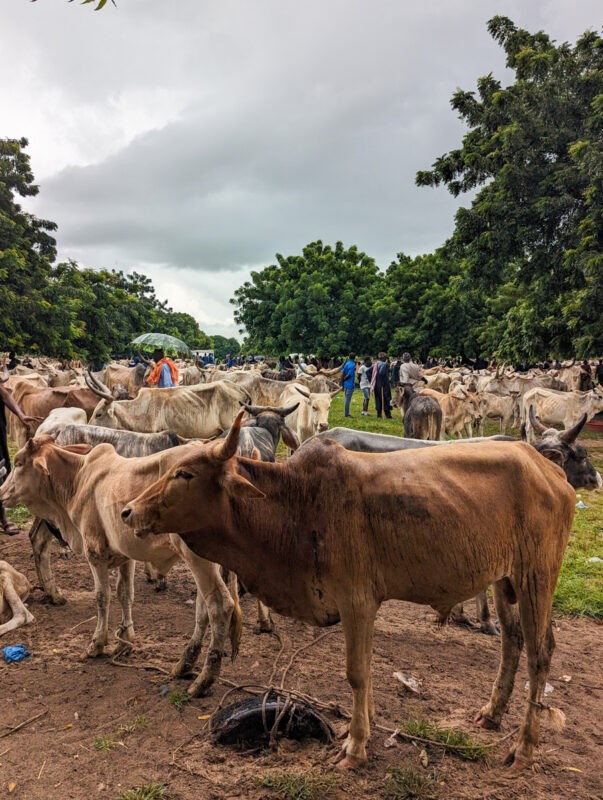
Channelling into the southern part of North Senegal’s coastline (just above where The Gambia separates the country in two), the UNESCO-listed Saloum Delta is lined with lush trees, punctuated by shell islands and is home to a plethora of excellent bird life.
Tours leave Hotel RIU Baobab to the Saloum Delta, although we did find that this tour didn’t actually see all that much of the delta itself.
We visited a couple of markets and a local village, which, while interesting, did feel slightly uncomfortable (as it felt like we were in the way when locals were going about their daily lives).
The only part that really focused on the delta itself was a twenty-minute boat ride, but we did a much better boat trip on the delta which we organised ourselves in Toubakouta (later on in our trip).
In all honesty, I wouldn’t recommend this tour if you’re planning on seeing more of Senegal, but if you won’t have another opportunity to see Senegal’s rural culture and nature it might be worth considering.
Goree Island and Dakar
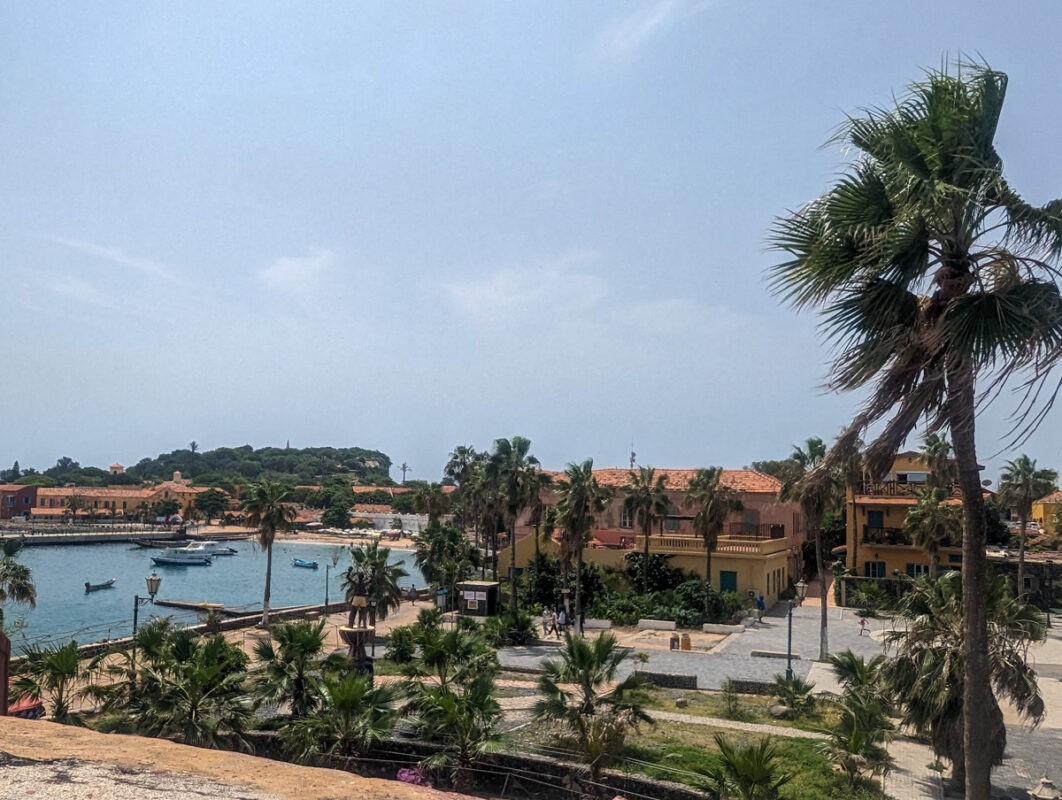
The hectic capital of Dakar sprawls along a peninsula in the central part of the country. While it’s not overwhelmed with tourist attractions, the African Renaissance Monument wows most visitors and the striking Mosque of the Divinity is worth admiring from above and below.
But the main place to visit in Dakar is the UNESCO-listed Goree Island. Nowadays a peaceful place with historic pastel-coloured houses lining narrow streets, Goree Island was once the largest island in West Africa where captive slaves were imprisoned before being transported to the Americas.
At the House of Slaves, whispers of the past cumulate in the door of no return, which was where West Africans would take their last step from their native continent.
It’s an emotional and difficult place to visit but remains one of the most historically important places to see in West Africa. As Léopold Sédar Senghor, the first president of Senegal, stated “becoming conscious of the past is the first duty of a people”, and visiting Goree Island is a catalyst for remembrance.
So, why visit Senegal’s beaches now?
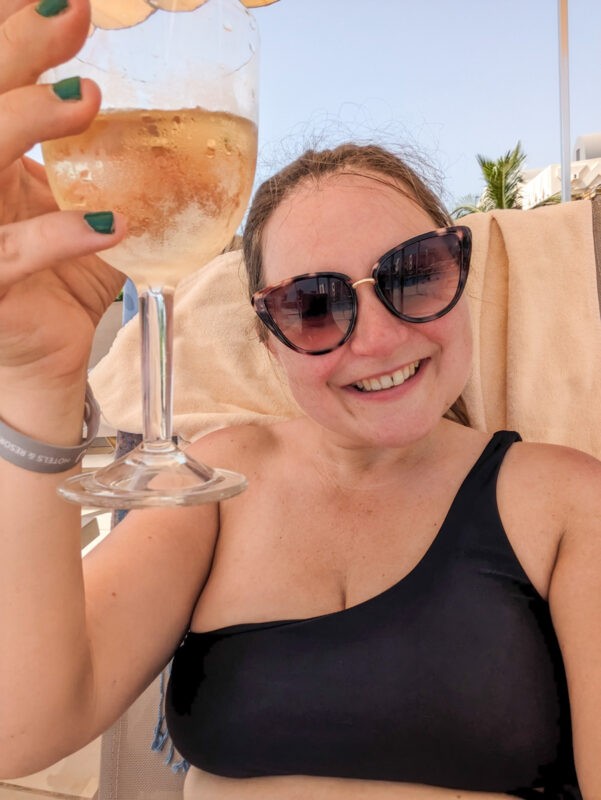
Senegal’s only just venturing onto the all-inclusive beach holiday scene, and while the beaches and resorts will be beautiful for years to come, I’d recommend heading there quickly.
Here’s why.
Get there before the crowds
I think Senegal’s the next big thing. The epic hotels, the safari opportunities, the history and nature wrap it up into a prime West African destination.
However, the tourists haven’t quite realised this yet. Visiting Senegal at the moment feels like a delicious secret that only you and a select few have discovered.
It’s excellent value for money
While a week at the all-inclusive Hotel RIU Baobab isn’t cheap per se, it’s a luxurious five-star hotel that would cost ten times the amount in other parts of the world.
As the tourists start to flock to Senegal, prices might go up – so snatch up these deals quickly!
It’s safe
Beach holidays in Senegal are very safe. The country in general has little crime; protests can erupt in Dakar but they’re usually contained to the city. Even if protests do happen, beach resorts remain secure.
This is unlikely to change any time soon, but tourists in the past have questioned the safety of Senegal. It’s perfectly safe to visit, so get here before the masses!
Visa policies are relaxed
Again, this is unlikely to change for the worse, but visa policies in Senegal have been relaxed in recent years. Head here now to make the most of 90-day visa exemptions (for the UK and many other passports).
So, are you ready to visit Senegal?
Winter sunshine, exotic animals, white-sand beaches and an inviting culture parcel Senegal up into the perfect West African beach destination.
With package holidays from TUI, it’s never been easier to visit this welcoming country: just visit now, before the secret gets out!

